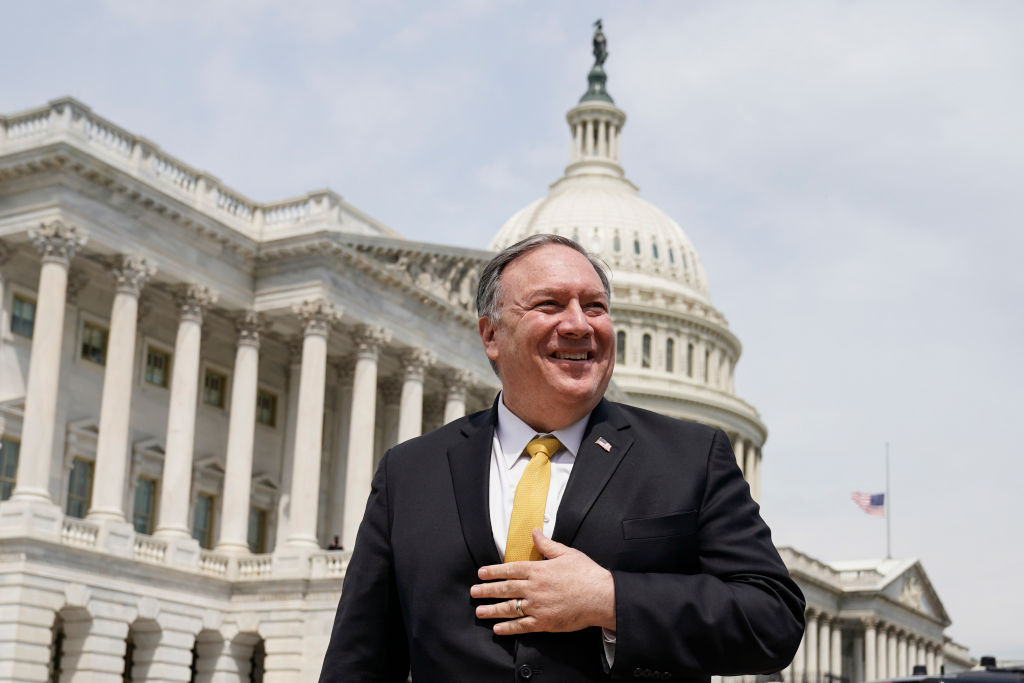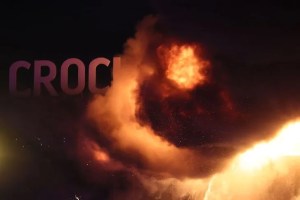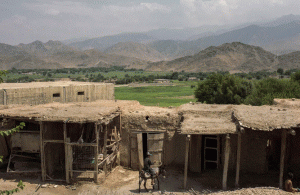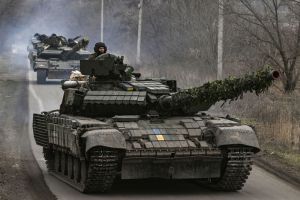President Biden blames Donald Trump and his former secretary of state Mike Pompeo for the debacle of the Afghanistan withdrawal. Mike Pompeo vehemently disagrees. In this exclusive interview with Urs Gehriger of the Swiss weekly Die Weltwoche, Pompeo sees America’s failure in Afghanistan and its loss of credibility as direct results of Biden’s policies of ‘weakness’ and warns that ‘if the Taliban decide that they’re going to become violent in a full-on assault, the US should use every element of its military power to protect American interests.’
Lausanne, Switzerland
Urs Gehriger: President Biden announced that he would withdraw all US military forces by August 31. It looks highly unlikely that this can be accomplished. Meanwhile the Taliban spokesperson Suhail Shaheen has issued a stern warning that August 31 is a ‘red line’. And he threatens: ‘If the US or UK were to seek additional time to continue evacuations — the answer is no. Or there would be consequences.’ Mr Secretary, what should the President’s response be?
Mike Pompeo: The Taliban have threatened Americans for an awfully long time now. Our response has always been to demonstrate strength and resolve and to protect America’s interest. It seems to me this is what America ought to do in this situation as well, the Nato forces that are still on the ground there as well. We should do the work that needs to be done. We should not depart this place until every Westerner, from our perspective, every American is home. If it’s unable to be done (by August 31), then we ought to make sure that we stay until that task is completed.
UG: If the Taliban follow through on their threat with armed force, do you think the US should intervene militarily?
MP: It’s absolutely the case that if the Taliban decide that they’re going to become violent in a way that you’re describing, a full-on assault, America should use every element of its military power to protect American interests. That includes certainly the folks that are there cobbled trying to get people out, but also the Americans that are trying to get to the airport and get out. This is pretty straightforward. This isn’t complicated, this isn’t the high art of diplomacy. This is execution of the protection of American interests, the same thing we have done for almost 20 years in Afghanistan.
UG: A military intervention would be fraught with great risks. Thousands of Americans and allies are stranded in Afghanistan, not only in Kabul but throughout the country. The likelihood of any of them coming to harm or being taken hostage is high.
MP: This is why we have to demonstrate resolve. By the way, you’re asking me to speculate and speculate and speculate. I’m loath ever to speculate.
UG: The troop withdrawal was President Trump’s initiative. With what mandate did he send you into the negotiations with the Taliban?
MP: President Trump wanted very much to get our American kids home, our soldiers, our sailors, our airmen and Marines. He wanted them out of Afghanistan. There was a second mission that was to protect the vital American interests, which predominantly are to make sure that we are not attacked from that place. By the way, this goes for our Nato friends as well. This was the mission set that he gave to us.
We were successful drawing down from 15,000 to about 2,500 Americans there, and we kept the country in a condition that didn’t result in what you’re seeing there today. We were able to do that. That’s because America was determined. It’s because America didn’t show weakness. It’s because when the Taliban pushed, we pushed back, instead of when the Taliban pushed, us withdrawing.
That central misconception of America as weak is something that has allowed the Taliban to do the things that it has done there.
We needed to continue down the policy that we had. It was a conditioned space departure from Afghanistan. We would have continued the withdrawal. The conditions were not right at any point in time for us to actually get down past 2,500, so the president made the decision not to do so. This is factual. You asked me to speculate on a number of things, I don’t have to speculate on what we actually did when we were in charge.
UG: President Biden withdrew troops before securing the safe removal of Americans. What does this tell you about Biden’s priorities?
MP: I just think they weren’t paying any attention to this. I think they’d made the decision to withdraw and then chose to do so in a way that fundamentally didn’t have to be so. They weren’t focused on making sure as we were every day that we were going to protect the things that matter. President Trump was going, not only about getting American citizens back but getting American equipment out as well. I can’t tell you how many times I heard President Trump say, ‘I want every high-end piece of equipment out of Afghanistan.’
By the way, I hear people talk about the Taliban agreement. I spoke to the Northern Alliance, I spoke with the government. We had an agreement with the government of Afghanistan too, with President Ghani, the corrupt terrible leader who fled the country at the first moment’s notice, but nonetheless we were working to try and create a parallel conversation, trying to get Afghans to talk to each other and develop a more organized government, less likelihood of civil war.
All of which were very tall tasks that we knew would take years, but this was against the backdrop of America also preparing the country for the time that the American forces would be reduced.
UG: What, in a nutshell, was the reason for President Biden’s failure and the Taliban’s seizure of power?
MP: The Taliban smelled weakness. They saw us hand a pipeline to the Russians. When they didn’t have to allow its completion, they saw us shut down our own pipeline inside of the country. They watched equivocal language when Iranian missiles were fired out of the Gaza Strip into Israel. When the Cuban people demanded their freedom, it took three or four days to declare communism a bad thing.
These were all symptoms of the same misunderstanding of how to use American power in a humble, realistic, yet very powerful way. Our administration tried to do that every day for four years. This administration flipped on each of those issues. Opened our southern border, wouldn’t support the Cuban people, handed a pipeline to the Russians. They went to Vienna negotiating with the Iranians. These are all things that signal to bad actors around the world that America is moving away from being leaders and moving away from using its power in ways that are good for, not only America, but for the world.
UG: In an internal State Department memo on July 13, 23 US Embassy staffers at Kabul, all Americans, warned that the collapse of Afghan forces and takeover of the Taliban was going much faster than expected and urging the Government to speed up the evacuation of Americans and Afghan allies. But only 1,200 were evacuated. What does that tell you about how highly the Biden government values the lives of Americans and their allies?
MP: I am outside, I don’t have any comment on that. There is enough information available today to suggest that they surely knew that there was risk associated in this and they had to have known that the conditions on the ground created a real risk that you could have happening, which is precisely happening today.
UG: The world is watching a US president who has fundamentally contradicted himself over the past weeks. First he said the chances of the Taliban overrunning Afghanistan are ‘highly unlikely’. Now he says that during a withdrawal, chaos was inevitable. Can we any longer count on Joe Biden as being a responsible president?
MP: The Biden administration went back to where we were for eight years (under President Obama), which was American leadership on the world stage apologizing for our bad behavior around the world. America is a resilient nation.
We’ve had 80 countries in the coalition to defeat Isis. We had built the Quad [the US, Japan, Australia and India] out in a way that was pushing back against the Chinese Communist party. We had an enormous coalition that was working with us. We had isolated Iran in a way that Iran had never been isolated today. The Trump administration built enormously powerful alliances. I hope the Biden administration begins to build on that, rather than undo them at every turn.
UG: America’s allies feel disavowed by Joe Biden. Armin Laschet, a leading candidate for German chancellorship, speaks of the ‘biggest debacle’ Nato has suffered since its founding. Has your phone been ringing from your former counterparts? Are they worried?
MP: I still talk to lots of folks around the world. I remind them we have transitions in power in the United States, but it’s a nation that is a good partner, and whoever the president is at any given time, I am confident in American strength and resolve. I hope that leaders in both parties in Congress will evaluate how we did this in Afghanistan and some of these other issues I raised as well.
We’ll begin to urge this president to act in a way that’s consistent with our founding, consistent with our history and our friends and our partners. This is what I tell them when I am talking to counterparts, I just urge them to remember the greatness of America. Because I want this administration to be successful. It matters to me, it matters to every American, it matters to the world.
UG: Mr Secretary, you were the chief architect of the ‘Agreement for Bringing Peace to Afghanistan’ with the Taliban that was signed in Doha in February 2020. A few days ago, I asked Gen. David Petraeus, ‘Was it a mistake to trust the Taliban?’ Petraeus said: ‘Sadly, it was. …We got virtually very little in return except for a Taliban pledge not to fight us.’ Watching the drama that is now unfolding, do you think you trusted the Taliban too much?
MP: That’s impossible because we didn’t trust them at all, but we wanted to provide guideposts. That’s what that document ultimately did. It said, ‘Here are the conditions, here are the demands that the United States has, here’s an exchange for that, here are the things that the United States will do if you comply with these demands.’ There was no trust about it. It was in the Reagan tradition.
UG: Peace through strength?
MP: ‘Peace through strength’ and ‘trust but verify’. We frankly had the motto that I had with China too, which was ‘trust but verify’…
You always make peace with your enemies. This is who you sit down with and talk to. The Taliban are certainly butchers who killed lots of Americans. We never took down our capacity to put enormous costs on the Taliban at any time during our four years. We always were there to deliver. We always had American airpower that was capable, we always had American ground forces supporting the Afghan forces there. The best evidence of this is, from the moment we executed that agreement, the Taliban never killed another American.
UG: I just want to quote a sequence of the agreement, one I believe is crucial. It states that the Taliban must ‘prevent any group or individual, including al-Qaeda, from using the soil of Afghanistan to threaten the security of the United States and its allies’.
MP: Yes, and they promised to break it. They promised to break that alliance. This is what we got them to commit to, we got them to commit to breaking it.
UG: But in an interview with Fox Nation’s Lara Logan a few weeks before Afghanistan fell to Taliban insurgents, the Taliban’s chief spokesman refused several times when he was asked to explicitly condemn al-Qaeda.
MP: Taliban spokesman Shaheen and Taliban leader Mullah Barader said, ‘We will do this.’ We should demand that they do.
UG: What do your sources say, how large is the al-Qaeda presence in Afghanistan nowadays?
MP: Al-Qaeda was several thousand men strong when we went in after the terrorist attacks 20 years ago. There were fewer than 200 al-Qaeda operatives in Afghanistan when we left office last January.
UG: So Biden is wrong when he says there’s no al-Qaeda in Afghanistan?
MP: No, he is wrong there. There are still al-Qaeda operatives there. There are these other organizations as well. The Haqqani network, an offshoot, a piece of al-Qaeda for sure. There’s also Isis operating there, and there are radical Islamic terrorists in Afghanistan today. It’s absolute. They’re also in the Philippines, they’re also in Africa: al-Shabaab. The largest al-Qaeda footprint is in Yemen, not in Afghanistan. AQAP, al-Qaeda in the Arabian Peninsula, is the largest al-Qaeda outfit in the world today. Its leadership, the al-Qaeda leadership is no longer in Afghanistan, it’s in Iran.
UG: Today al-Qaeda’s senior leadership are in Tehran?
MP: Yes. We all have our eye on Afghanistan because of the horrific human rights violations and the risk to westerners that is taking place there. But make no mistake about it, the threat from al-Qaeda, the threat from radical Islamic terrorism is in no way limited to Afghanistan. It is broader than that, it is bigger than that, it is more complex than that, and is being run out of Iran.
When I hear my European friends say, ‘We need to get back in this deal with the Iranians.’ If you want to know who’s actually negotiating with al-Qaeda, or people who are harboring the al-Qaeda senior leadership, it is indeed those who are sitting across the table, the men who work for Ebrahim Raisi.
This gets lost in the narrative of the day. CNN is not going to talk about this. CNN is not going to talk about the fact that al-Qaeda senior leadership today is not in Afghanistan, it’s in Tehran. This is very telling and important.
UG: In what ways does the chaos that we see now in Afghanistan embolden Iran, the host of the leadership of al-Qaeda?
MP: The Iranians have an opportunity and a problem. Their problem is that they share a border with Afghanistan, which creates risk. These terrorists can move in there. There’s always been a conflict between the Shi’a extremists and the Sunni extremists. But we’ve also seen, because al-Qaeda’s leadership is in Iran, that they can work together. When they fight each other, that’s fine, but when their opponent is America or Israel, they’re happy to work alongside of each other.
The opportunity they now have is that they can see that the American leadership is going to let them do things that President Trump and our team would not have let them do. President Biden already released billions of dollars to them that was blocked during our time in office. I think the number was $7 billion or so. I think Iran sees that they can continue to demand things from this administration, then they’re likely to get them. I think Iran will see this as an opportunity, but know too that they’ve got to find a path forward with the Taliban. It is a mixed relationship for sure.
UG: While Afghanistan turned into a debacle for America and the West, Beijing has silently established contacts with the Taliban and is seeking infrastructure deals with the zealots. How high do you think the danger is that China’s ambition to become the leading world power will grow even faster?
MP: They’re certainly going to use this as propaganda. They will use it as a propaganda coup to say the Americans lost to Taliban when they were a weak nation, but they know it’s only propaganda. They know America actually is pretty darn strong and pretty darn capable. In that sense, the Chinese have told me repeatedly they’re very concerned about terrorism emanating. We know what they’ve done in Western China, they’ve locked down these people they claim were terrorists, which is truly Uighurs trying to practice their own faith.
The Chinese are confronted now with greater risk of terrorism. It’s probably why they went to talk to the Taliban. It wasn’t for the minerals, it was to try and find a path forward to convince the Taliban not to build out terror organizations or permit terror organizations to be built out to threaten them. For the Chinese, much like for the Iranians, Afghanistan becomes a much more complicated problem, but they’ll certainly use this in ways that will benefit them as well.
UG: Back to the Afghan fiasco. What needs to be done immediately by the American government?
MP: The first thing we should do is we’re going to get every American out or we’re going to stay there until we’re done. We’re going to use the full power of the American arsenal to get them all home. Period, full stop.
Urs Gehringer is the foreign editor of the Swiss weekly Die Weltwoche.


















